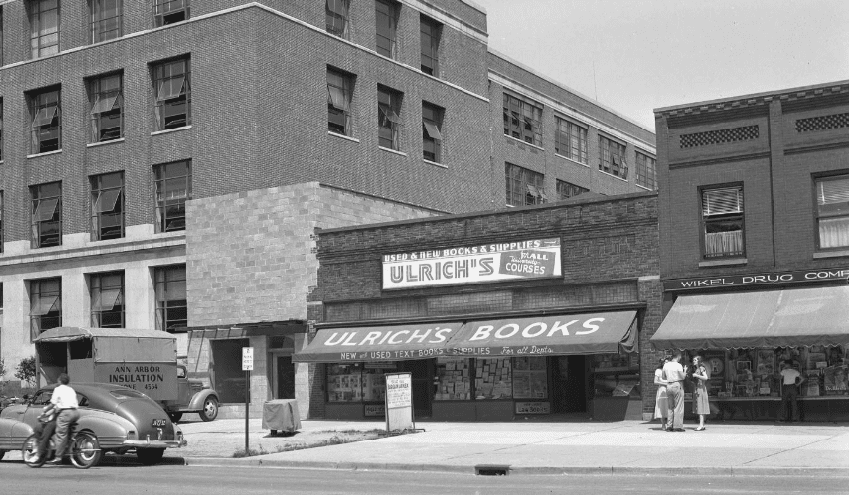The Oct. 31 closure of Ulrich’s Bookstore ended an eighty-eight-year run as a campus-area institution that touched millions of lives in ways big and small.
The history of the once-vibrant South University shopping district can’t be told without it, nor can the story of the Ann Arbor Art Fairs that founder Fred Ulrich helped launch in 1960.

Ulrich’s in 1949. Along with selling books and supplies to generations of students, Fred Ulrich ended up owning most of the adjacent block on South U, setting the stage for its ongoing high-rise development. | Photo courtesy U-M Bentley Historical Library
Ulrich was just thirty when he took over the bookstore at 549 East University in 1934. He put his name on the store and led it through an expansion in 1939 and again in 1950.
Active in civic affairs and real estate—he eventually owned most of the block between East U and Church—he sold the business to three of his longtime managers: Howard Baker, Ernie Bundy, and Milt Moore. But he kept the building and reportedly insisted that Ulrich’s remain the bookstore’s name in perpetuity.
Baker and Bundy were the textbook experts, while supply manager Moore became the general manager. All three are now deceased, but as Moore’s widow Dee recounts, “The books are the thing that brought the students into the store, but then the profit was certainly not from the books. They never made money on the books, but they made money on all the merchandise and everything else that was bought.”
That included an increased focus on U-M spirit wear—T-shirts, socks, hats, and all manner of what the trade then called “software,” before the word took on its significance in computing.
The Moores’ daughter, Karen Sakalys-Moore, recalls that while Ulrich and Moore always retained high mutual regard, Ulrich seemed surprised that the trio’s success allowed them to retire their business purchase loan ahead of schedule. “Fred was a little upset that they paid it off so quickly, but Dad said, ‘You taught me well!’”
She carries many fond childhood memories working with her father (whom she called Mr. Moore in the store) to set up and tear down the art fair booths he had built. “Everybody contributed what they could do, and dad was a woodworker,” she says.
Dee Moore reflects that Ulrich’s wasn’t always thriving, but one boom arrived when her husband “got involved with the Hewlett-Packard people who had the first handheld calculator.” The HP-35 was introduced in 1972 at a retail price of $395, equivalent to about $2,800 today. “People were lined up at the store just to test it.”
Ulrich’s had a world exclusive for a time, shipped calculators around the world, and opened Ulrich’s Electronics across the street. Sakalys-Moore remembers her father saying of the pricey devices, “If we lose one of these, we could lose the store.” They even resorted to having inventory shipped to them in coffins to disguise the valuables inside.
More people-person than techie, Moore sensed the electronics business was getting unwieldy, so Ulrich’s exited the sector in the 1980s. The three partners had hoped to retire altogether by selling Ulrich’s to a group of employees, as Fred Ulrich had done with them a generation before, but, according to both Moore’s widow and daughter, fiscal fallout from mismanagement below proved fateful.
They sought an outside buyer but ruled out Follett’s, a longtime competitor on S. State St. In 1986, local ownership ended with the sale to Nebraska Book Company—though Sakalys-Moore is proud to note that the terms included retaining existing management. The sale included the Ulrich’s bookstore at Washtenaw Community College, the campus’s first.
When Nebraska Book filed for bankruptcy protection in 2011, its holdings also included Michigan Book and Supply, which closed the following year. Follett Corporation ended up with Ulrich’s after all with its 2015 purchase of Nebraska Book’s retail store division.
Development of Vic Village North on South U prompted a 2017 move to a temporary location at 610 Church St. before Ulrich’s lived out its remaining five years at 1200 South University, a block east of its longtime home. That space is now subsumed into the student high rise. Both it and Vic Village South, now rising across the street, were built on property purchased from the Ulrich Trust.

